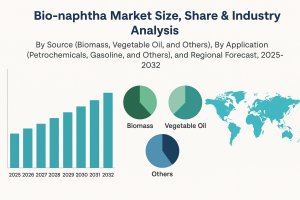
According to Fortune Business Insights, The global bio-naphtha market was valued at USD 2.49 billion in 2024 and is expected to grow from USD 2.77 billion in 2025 to USD 6.36 billion by 2032, exhibiting a CAGR of 12.6% during the forecast period (2025–2032). Europe held the leading position in the market, accounting for 36.54% of the global share in 2024.
The global bio-naphtha market is witnessing significant growth, driven by increasing demand for sustainable and renewable alternatives to fossil fuels. Bio-naphtha, derived from biological feedstocks such as vegetable oils, agricultural waste, and used cooking oil, serves as an eco-friendly substitute for conventional naphtha in various industries including petrochemicals, transportation, and energy.
The transition toward a circular and low-carbon economy is propelling the demand for bio-naphtha worldwide. This renewable chemical feedstock is primarily used in the production of olefins, plastics, and gasoline blending. Growing awareness about greenhouse gas (GHG) reduction and supportive government regulations encouraging the use of bio-based products further boost the market growth.
According to industry analysis, the bio-naphtha market is expected to grow at a healthy CAGR during 2024–2032, driven by robust demand from the petrochemical and energy sectors.

By Feedstock:
By Application: